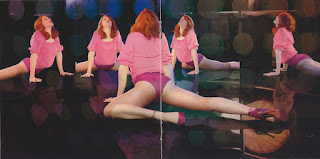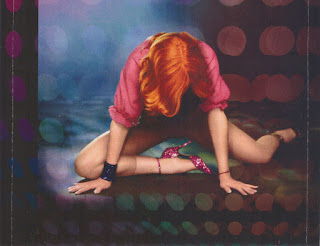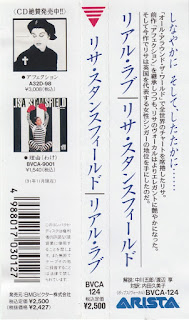Confessions on a Dance Floor is the tenth studio album by American singer and songwriter Madonna. It was released on November 15, 2005, by Warner Bros. Records. A complete departure from her previous studio album American Life (2003), the album includes influences of 1970s and 1980s disco, as well as modern-day club music. Initially, she began working with Mirwais Ahmadzaï for the album but later felt that their collaboration was not going in the direction she desired. Madonna took her collaboration with Stuart Price who was overviewing her documentary I'm Going to Tell You a Secret. The album was mainly recorded at Price's home-studio where Madonna spent most of her time during the recordings.
Musically, the record is structured like a DJ's set. The songs are sequenced and blended so that they are played continuously without any gaps. The title arrived from the fact that the album tracklisting consists of light-hearted and happy songs in the beginning, and progresses to much darker melodies and lyrics describing personal feelings and commitments. Songs on the album sample and reference the music of other dance-oriented artists like ABBA, Donna Summer, Pet Shop Boys, the Bee Gees and Depeche Mode, as well as Madonna's 1980s output.
Madonna promoted the album through several live performances and a promotional tour. She embarked on the Confessions Tour in 2006, which became the highest-grossing tour ever for a female artist at that time. Four singles were released from the album. "Hung Up", the lead single, topped the charts in a total of 41 countries. According to Billboard, it was the most successful dance song of the decade. It was followed by "Sorry" which became Madonna's twelfth number-one single in the United Kingdom. "Get Together" and "Jump" were released as the third and fourth singles respectively, both becoming top-ten hits in several countries.
Most critics praised the album, calling it a return to form for Madonna and ranking it alongside her best albums. Madonna was honored with a Grammy Award for Best Electronic/Dance Album in 2007, as well as International Female Solo Artist at the 2006 BRIT Awards. Commercially, the album peaked at number one in 40 countries, earning a place in the 2007 Guinness World Records for topping the record charts in the most countries, and has sold over 10 million copies worldwide. Ranked third on "The 99 Greatest Dance Albums of All Time" by Vice magazine, the album is noted as a testament to Madonna's longevity with the ability to continuously reinvent herself in the third decade of her career.
Confessions on a Dance Floor merged elements from 1970s disco, 1980s electropop and 2000s club music. Madonna decided to incorporate elements of disco in her songs while trying not to remake her music from past, instead choosing to pay tribute towards artists like the Bee Gees and Giorgio Moroder. The songs reflected Madonna's thoughts on love, fame and religion, hence the title Confessions on a Dance Floor. It was the complete opposite direction from her previous studio effort American Life (2003). The songs on that album were a form of diatribe directed at the American society. However, Madonna decided to take a different direction with this album. Regarding the development, Madonna commented:
"When I wrote American Life, I was very agitated by what was going on in the world around me, [...] I was angry. I had a lot to get off my chest. I made a lot of political statements. But now, I feel that I just want to have fun; I want to dance; I want to feel buoyant. And I want to give other people the same feeling. There's a lot of madness in the world around us, and I want people to be happy."
She started to work with Mirwais Ahmadzaï with whom she had previously developed her eighth album Music (2000). However, that collaboration did not suit Madonna's musical direction. According to Madonna, "[Producer] Mirwais is also very political, seriously cerebral and intellectual. All we did was sit around, talking politics all the time. So, that couldn't help but find its way into the music. I think there's an angry aspect to the music that directly reflects my feelings at the time." Hence after recording tracks with Mirwais, Madonna decided to stop the project and start fresh. It was then that she turned to Stuart Price who had served as musical director on her two previous concert tours and co-wrote one song on American Life.
In 2004, after the release of American Life, Madonna began working on two different musicals: one tentatively called Hello Suckers and another one with Luc Besson, who previously directed the music video for her single "Love Profusion"., which would portray her as a woman on her deathbed looking back on her life. Madonna collaborated with Patrick Leonard, Ahmadzaï and Price to write new songs, the latter being assigned to pen disco songs sounding like "ABBA on drugs". However, Madonna found herself dissatisfied with the script written by Besson and scrapped it. Hence Madonna and Price decided to use the compositions for the album instead. According to Madonna, it was easy for her to shift from her previous album's sentiments, since she included those political views in her documentary I'm Going to Tell You a Secret. She elaborated:
I was running back and forth, literally, from the editing room with [the documentary's director] Jonas Akerlund to working with Stuart, who was also mixing the music in the film. We were together, non-stop, all of us. Cutting 350 hours of film down to two hours. There are a lot of serious aspects to the movie. I needed a release. When I would go to Stuart's, and we'd go up to his loft, it was like, 'Honey, I want to dance.' I wanted to be happy, silly and buoyant. I wanted to lift myself and others up with this record. So, yes, the new album was a reaction to all the other stuff I was doing, which was very serious in nature. I hope that doesn't imply that I wanted to make a superficial record, because it's not. I want people to smile when they hear this record. I wanted it to put a smile on my face, too.
The first three songs that were written for the album were "Hung Up", "Sorry" and "Future Lovers" In an interview with Billboard, Madonna commented that the recording process was a give-and-take situation. According to her, Price used to stay up all night working on the songs. This was helped by the fact that he is a DJ and is used to staying awake all night. This gave Madonna the chance to work on other aspects of the compositions. She noted the fact that she and Price had opposite characteristics, which helped in their collaboration. The songs were mainly recorded at Price's home. Madonna said:
We did a lot of recording at his house. I'd come by in the morning and Stuart would answer the door in his stocking feet - as he'd been up all night. I'd bring him a cup of coffee and say, 'Stuart, your house is a mess, there's no food in the cupboard.' Then I'd call someone from my house to bring food over for him. And then we'd work all day. We're very much the odd couple.
She further elaborated that their camaraderie was also because they had toured together for Madonna's Re-Invention World Tour. Hence Madonna reflected that her relationship with Price was more of a brother-sister kind than the formal collaborations she was accustomed to during the recording process.
Confessions on a Dance Floor is primarily a dance, electronica, disco, and deep house record. It is structured like a nightly set composed by a DJ. The music starts light and happy, and as it progresses, it becomes intense, with the lyrics dealing more about personal feelings, hence "Confessions". According to Madonna, "[t]his is the direction of my record. That's what we intended, to make a record that you can play at a party or in your car, where you don't have to skip past a ballad. It's nonstop." Madonna used samples and references of music by other disco artists. In the album's first song, "Hung Up", she sampled ABBA's 1979 hit "Gimme! Gimme! Gimme! (A Man After Midnight)", for which she wrote a personal letter to songwriters Benny Andersson and Björn Ulvaeus, who permitted Madonna to use the track. References of other disco-influenced acts, including Pet Shop Boys, Depeche Mode, and Daft Punk, were also used on the album, as were the disco hits of Parisian DJ Cerrone. The album has a song called "Forbidden Love", which is different from the same-titled song from Madonna's sixth studio album Bedtime Stories. Regarding sampling herself and her own song names, Madonna commented:
"I did all of that on purpose, [...] I mean, if I'm going to plagiarize somebody, it might as well be me, right? I feel like I've earned the right to rip myself off. 'Talent borrows, genius steals,' [...] "Let's see how many other clichés I can throw in there. That's exactly it. I was only hinting early on, but then I tell it like it is. It's like, now that I have your attention, I have a few things to tell you."
A pulsating rhythm is present in the song "Isaac", which is regarded as the only song close to a ballad on the album. However, the song was heavily criticized by a group of Israeli rabbis who commented that Madonna was committing a blasphemy with their religion. They said that the song was about sixteenth-century Kabbalah scholar Yitzhak Luria. In reality, the song was named after the featured vocalist Yitzhak Sinwani, who sang portions of the Yemenite Hebrew poem Im Nin'alu in the track, as well as references to the Biblical story of Abraham and Isaac. Initially, Madonna toyed with the idea of calling the song as "Fear of Flying" since the idea behind the composition was to let go. However, at the end she decided to just call it "Isaac" after the English version of Sinwani's name. Regarding the song's development and the condemnation of the Rabbis, Madonna said:
"You do appreciate the absurdity of a group of rabbis in Israel claiming that I'm being blasphemous about someone when they haven't heard the record, right? And then, everyone in the media runs with it as if it's the truth. And that's a little weird. But what's even weirder is that the song is not about Isaac Lurier [sic], as the rabbis claim. It's named after Yitzhak Sinwani, who's singing in Yemenite on the track. I couldn't think of a title for the song. So I called it "Isaac" [the English translation of "Yitzhak"]. It's interesting how their minds work, those naughty rabbis. [...] He's saying, "If all of the doors of all of the generous peoples' homes are closed to you, the gates of heaven will always be open." The words are about 1,000 years old. [...] [Yitzhak] is an old friend of mine. He's never made a record. He comes from generations of beautiful singers. Stuart and I asked him to come into the studio one day. We said, "We're just going to record you. We don't know what we're going to do with it." He's flawless. One take, no bad notes. He doesn't even need a microphone. We took one of the songs he did and I said to Stuart, "Let's sample these bits. We'll create a chorus and then I'll write lyrics around it." That's how we constructed it."
The lyrics of the songs on the album incorporate bits of Madonna's musical history and are written in the form of confessions. "Hung Up" contains lyrics from Madonna's 1989 duet with Prince called "Love Song", from the Like a Prayer album. "How High" continues the themes of two songs from Madonna's eighth studio album Music, namely "Nobody's Perfect" and "I Deserve It". The lyrics of "Push" thank the person who challenged her to expand her limits and also incorporate elements of The Police's song "Every Breath You Take". Other tracks like "Sorry" include the title word in ten different languages (several of which are non-idiomatic). In "I Love New York" (written at the time of American Life), she praises the city where her career began and replies to negative comments made by George W. Bush. Elsewhere, Madonna sings about success and fame ("Let It Will Be") and the crossroads of past, present and future ("Like It or Not").
Track listing
Confessions on a Dance Floor – Standard edition
- "Hung Up" 5:36
- "Get Together" 5:30
- "Sorry" 4:43
- "Future Lovers" 4:51
- "I Love New York" 4:11
- "Let It Will Be" 4:18
- "Forbidden Love" 4:22
- "Jump" 3:46
- "How High" 4:40
- "Isaac" 6:03
- "Push" 3:57
- "Like It or Not" 4:31
Total length: 56:28























































